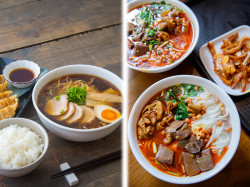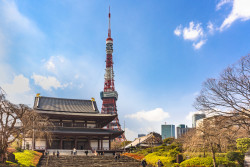
Originally published on metropolis.co.jp on July 2011

Combining a natural eatery with a herbal clinic might sound a bit like opening a fine French restaurant inside a hospital emergency room. But 10-Zen in Shinagawa could neutralize your preconception—while tranquilizing your natural processes.
10-Zen (pronounced “ju zen”) is a one-stop shop for all things kampo–Japan’s traditional style of herbal medicine. Both a restaurant and an herbal clinic, it also sells an extensive selection of kampo products and a few books—along with offering classes and a teeny-tiny “museum.”
When you think of ingredients such as ginger, cinnamon, licorice, clove and yamaimo you probably wouldn’t be surprised to find them on the dinner table as well as in certain traditional herbal remedies. And that overlap is what is to be discovered here, giving herbs and food something of a cousin-like relationship.
The natural-styled interior of 10-Zen is bright and open. It’s decorated with large glass cylinders containing real herb specimens that immediately put you in a vibrant and healthy mood—whether you’re there for a meal or an herbal consult. The kitchen and the dispensary, though at opposite ends of the shop, make good use of the copious natural light, high ceilings and open workspaces seen by patrons. Both cooks chopping vegetables and staff mixing herbs are always on display, reinforcing the blurry division between diet and medicine.
The restaurant specializes in Chinese-style “hot-pot” meals, shabu-shabu-like dishes with two flavors of stock separated in the pot: one spicy and one savory. These hot-pots are not cheap, weighing in from ¥3,800 per person at lunch to more than ¥5,000 in the evening. However, each meal boasts a different therapeutic effect, such as “vitalizing energy”, “detoxifying” or “beautiful skin.” At lunch you can take advantage of easier-priced set meals (¥1,300-2,500), which can also be selected based on the particular health benefits you’re looking for. Appetizers, desserts and an extensive drinks list are also available, with many of these items’ purported health benefits explained on the menu. For less medicinal drinking options, you can go for beer, wine, and sake; or continue the herbal theme and order some kanshu (kampo alcohol).

We started with the organic vegetable platter with a miso and cheese-based dip. The carrots, radishes and greens came in forms commonly seen in backyard gardens, not the uniform factory-produced variety found at supermarkets. They had the wide-awake taste of homegrown produce. This vibrancy of ingredients was to be the best thing about our meal, from the seasonal vegetable soup to the mixed black and white, all-you-can-eat rice—to even the mugwort chiffon cake.
If anything negative can be said about the cuisine, it’s that the chefs did not truly make the flavorful ingredients sing to their potential. However, I was told the heartier chicken broths and hot-pot meals are more scrumptious.
10-Zen’s tea menu edges closest to the border between food and medicine. Most herbal teas served at restaurants seem mildly sweet or lightly aromatic—like steeped chamomile or mint—but not so here. These brews are true herbal creations with ingredients mixed according to ancient Oriental medicinal theory. Although light enough to blend well with a meal, the flavors are intense and unusual, and may take some getting used to for the uninitiated.
If your meal gets you in the mood for an herbal consultation, you can have one for free at the dispensary on the premises, with English-speaking staff available. While there is no official kampo certification in Japan, 10-Zen’s staff has undergone private training and a quick glance at the textbooks used in their in-house school shows they are taught traditional kampo theory and diagnosis. Consultations seemed quite thorough, lasting an hour or more, and an herbal regimen is recommended afterward. Prices range from ¥250-800 per day, depending on if you select the potent boil-your-own mixtures, powdered herbs or pre-made pills.







